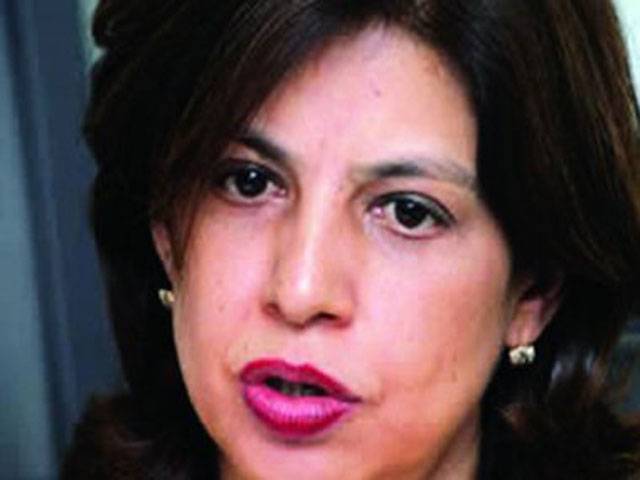ISLAMABAD - Pakistan Thursday said its lifting of a six-year-old moratorium on the death penalty would not affect its GSP Plus trade deal with the European Union (EU).
“We do not expect that this issue will have impact on Pakistan’s GSP Plus status,” Foreign Office spokesperson Tasneem Aslam told a weekly press briefing.
The EU granted Pakistan ‘GSP+’ status in 2014 subject to enacting certain commitments on human rights by Islamabad.
Commenting on the recent statement issued by European Union about its concern on execution of death penalties in Pakistan, the spokesperson said, “Pakistan has its own constitution and legal system which contains death penalty within the parameters of international laws”.
She said it is the fundamental right of the state to protect the lives of its people and the death penalties are being executed to protect the rights of its people.
Referring to Article 6 of International Covenant on Civil and Political Rights, she said every human being had the right to live and that this right should be protected by law.
About the death penalties being executed in Pakistan, she said the actions were being taken in pursuance to this article to protect the lives of the people.
Tasneem said Pakistan was engaged with the European Union and conveyed to them clearly about the legal process of Pakistan.
She said the EU also understood Pakistan’s position under which it had removed the moratorium on death sentence.
Answering a question about any impact of death penalties on the GSP Plus status given to Pakistan from European Union, she expressed the confidence that this issue would not impact the GSP Plus status.
Commenting on the statements from India on Mumbai attack case, the spokesperson said the trial inside Pakistan was continuing in accordance with the details provided by India. She said, “Pakistan wants to see culmination of this process at the earliest”.
Capital punishment was reintroduced in December as part of Pakistan’s moves to step up the fight against militants following a Taliban massacre at Army Public School in Peshawar.
The death penalty was extended to all capital cases last week, with a total of 52 people so far sent to gallows.
Regarding delay in the trial process, the spokesperson clarified that the trial was delayed not because of Pakistan but due to the non-cooperative attitude of New Delhi because it had not given access to Pakistan’s judicial commission to examine witnesses in India.
She said it was unfortunate that Pakistan was not provided access to the only survivor in this incident and the permission to the members of the judicial commission was granted when the only survivor was hanged.
The spokesperson also reminded that trial in Samjhauta terror attack in which several Pakistanis were killed had not yet started despite the fact that Hindu extremists Swami provided details of the involvement of Indian army men in this incident.
“We should not have double standards in dealing with the incidents of terrorism as it requires even-handed approach and concerted efforts to defeat terrorism,” she added.
Replying to a question about international reaction to the incident of suicide attacks on two churches in Lahore, the spokesperson said Pakistan had been facing threat of terrorism for last 30 years. She said in many terrorists’ attacks, many Pakistanis belonging to different religions were killed, adding that they were all Pakistanis and there was no justification to highlight the issue on the basis of religion or minority only.
Commenting on the Afghan reconciliation process, the spokesperson said the dialogue or reconciliation process was vital for lasting peace and stability in Afghanistan and the region.
She said, “Pakistan has welcomed Afghan government’s dialogue offer to Afghan Taliban to resolve political differences and we welcome the renewed prospects of talks between both parties”.
About Pakistan’s policy in this reconciliation process, the spokesperson said Pakistan on its part would continue to support and facilitate the process in every possible manner but the process should be Afghan-led and Afghan-owned.
Commenting on the return of refugees from Pakistan to Afghanistan, the spokesperson said recently an Afghan minister had visited Pakistan and discussed the issue with Pakistani leadership.
She said so far there had been no new agreement in this regard and under the previous agreement signed between Pakistan, Afghanistan and UNHCR, the Afghan refugees had to be repatriated by December 31, 2015. She expressed the hope that Afghan government and the UNHCR would take appropriate steps so that these Afghan refugees could be returned to their homeland according to the agreement.
Commenting on reports of cancellation of proposed visit of President of Sri Lanka to Pakistan, the spokesperson said no dates for the visit were finalised; therefore, there is no question of postponement of the visit.
About the visit of Chinese president or premier to Pakistan to witness March 23 military parade, the spokesperson said Pakistan had no such policy in the past to invite foreign dignitaries on this occasion.
She however said the visit of Chinese president was on the cards and its dates will be finalised through diplomatic channels of the two countries and the dates and tentative schedule and agenda of the visit would be announced simultaneously from Islamabad and Beijing when it will be finalised.
To a question about non-cooperation of Pakistan’s embassy staff with Pakistanis in Iraq, the spokesperson said these reports are baseless. She explained the staff of Pakistan’s embassy in Iraq had been extending help and cooperation to Pakistanis who contacted them.
Saturday, April 20, 2024
Executions won’t affect GSP Plus status: FO
| Says India’s non-cooperative attitude delaying trial of 26/11 accused

Policitising Tragedy
April 20, 2024
Tehran to Rafah
April 20, 2024
A New Leaf
April 20, 2024
A Tense Neighbourhood
April 19, 2024
Dubai Underwater
April 19, 2024
Dangers of Deepfakes
April 20, 2024
Feudalism
April 20, 2024
Kite tragedy
April 19, 2024
Discipline dilemma
April 19, 2024
Urgent plea
April 19, 2024
ePaper - Nawaiwaqt
Advertisement
Nawaiwaqt Group | Copyright © 2024





